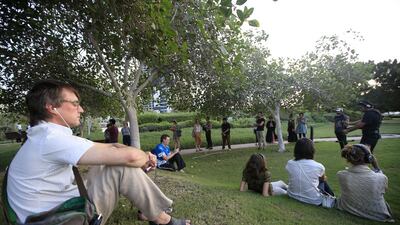Perhaps you saw us around 6:00pm last Saturday? We were the group wearing headphones and leaning over the balcony of a shopping centre watching people go up and down on the escalators. After about five minutes of watching in silence, we applauded, as if we were the audience at a show. Some of the people on the escalators waved in response and one man offered a quick bow, but most of the people looked startled: what had they missed?
I wasn’t part of a flash mob, although I suppose to the people on the escalators that’s what it looked like. No, I was part of “art”, or rather, I was part of something that made the Saturday evening shoppers seem like actors in a play: “Remote Abu Dhabi”, an experience orchestrated by a set of Berlin artists called Rimini Protokoll and sponsored by Durub Al Tawaya, a part of Abu Dhabi Art. Before this experience, I wouldn’t have thought that taking a group of people on a walking tour would have counted as “art”, but now I’m pretty sure that it is, if by “art” we mean an active reframing of our everyday world.
The electronic voice in our headset (who started as “Rachel” and then became “Peter”) called us the “horde” and we did indeed move as a group. But unlike most tour groups, people on this tour didn't talk to one another. And on some level, isn’t that the experience of urban life (once we get out of our cars, that is)? We stand crowded together on the bus, the train or the lift, together with strangers and yet holding ourselves apart?
Peter and Rachel made connections between the growth of the city and the growth of the body and asked us to think about where we go, how we move, what we see – with the result that, for a few hours, I felt more intimately connected to the city and its rhythms.
Peter and Rachel asked us to dance and we did (some more self-consciously than others). Suddenly we were the players being observed by the “audience”, who thus became unwitting collaborators in the Protokoll project; we were linked by the experience.
I will keep the secret of our final destination but will say only that we were in a familiar place, but we saw it from an unfamiliar vantage point – high above the city, which we saw arrayed before us like a stage set: a scrim of vertical lights dotted by the anchoring green lamps of the mosques, and an elegant crescent moon floating just so, between two buildings. It seemed inconceivable, standing there, that bombs had exploded in Paris the day before, and in Beirut the day before that.
While we gazed at the city, I thought about the stories contained inside all those buildings. Was someone dying somewhere, surrounded by family – or worse, alone? Was a baby being born to overjoyed, slightly terrified, parents? Was someone being diagnosed with a horrible disease somewhere, while someone else was being cured? All those stories suddenly connected with mine: I was remote, true, but still connected.
It would be naive, I suppose, to say that art can make the world a better place, but how else will we be able to reframe how we look at each other, so that what we see is not our difference from one another, but our essential humanity?
Deborah Lindsay Williams is a professor of literature at NYU Abu Dhabi

